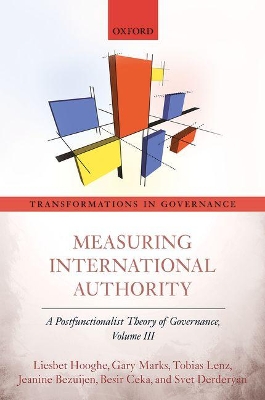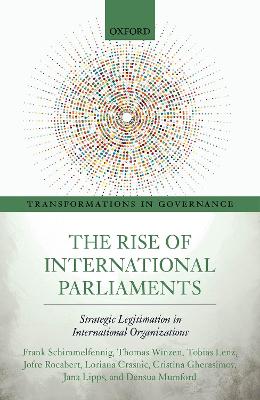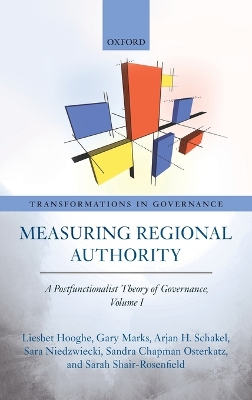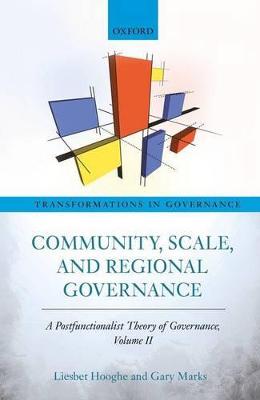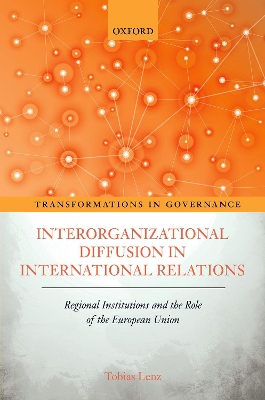Transformations in Governance
5 total works
Measuring International Authority
by Liesbet Hooghe, Gary Marks, Tobias Lenz, Jeanine Bezuijen, Besir Ceka, and Svet Derderyan
Published 17 August 2017
This is the third of five ambitious volumes theorizing the structure of governance above and below the central state. This book is written for those interested in the character, causes, and consequences of governance within the state.
This book sets out a measure of authority for seventy-six international organizations (IOs) from 1950, or the time of their establishment, to 2010 which can allow researchers to test expectations about the character, sources, and consequences of international governance. The international organizations considered are regional (e.g. the EU, Andean Community, NAFTA), cross-regional (e.g. Commonwealth of Nations, the Organization of Islamic Cooperation), and global (e.g. the UN, World Bank, WTO).
Firstly, the book introduces carefully constructed estimates for the scope and depth of authority exercised by international governments. The estimates are unique in their comparative scope, their specificity, and time span. Secondly, it describes describe broad trends in IO authority by comparing
delegation and pooling, over time, across IOs, and across decision areas. Thirdly, it presents the evidence gathered by the authors to estimate international authority by carefully discussing forty-seven international organizations, and showing how their bodies are composed, what decisions each body makes, and how they make decisions.
Transformations in Governance is a major new academic book series from Oxford University Press. It is designed to accommodate the impressive growth of research in comparative politics, international relations, public policy, federalism, environmental and urban studies concerned with the dispersion of authority from central states up to supranational institutions, down to subnational governments, and side-ways to public-private networks. It brings together work that significantly
advances our understanding of the organization, causes, and consequences of multilevel and complex governance. The series is selective, containing annually a small number of books of exceptionally high quality by leading and emerging scholars.
The series targets mainly single-authored or co-authored work, but it is pluralistic in terms of disciplinary specialization, research design, method, and geographical scope. Case studies as well as comparative studies, historical as well as contemporary studies, and studies with a national, regional, or international focus are all central to its aims. Authors use qualitative, quantitative, formal modeling, or mixed methods. A trade mark of the books is that they combine scholarly rigour with
readable prose and an attractive production style.
The series is edited by Liesbet Hooghe and Gary Marks of the University of North Carolina, Chapel Hill, and Walter Mattli of the University of Oxford.
This book sets out a measure of authority for seventy-six international organizations (IOs) from 1950, or the time of their establishment, to 2010 which can allow researchers to test expectations about the character, sources, and consequences of international governance. The international organizations considered are regional (e.g. the EU, Andean Community, NAFTA), cross-regional (e.g. Commonwealth of Nations, the Organization of Islamic Cooperation), and global (e.g. the UN, World Bank, WTO).
Firstly, the book introduces carefully constructed estimates for the scope and depth of authority exercised by international governments. The estimates are unique in their comparative scope, their specificity, and time span. Secondly, it describes describe broad trends in IO authority by comparing
delegation and pooling, over time, across IOs, and across decision areas. Thirdly, it presents the evidence gathered by the authors to estimate international authority by carefully discussing forty-seven international organizations, and showing how their bodies are composed, what decisions each body makes, and how they make decisions.
Transformations in Governance is a major new academic book series from Oxford University Press. It is designed to accommodate the impressive growth of research in comparative politics, international relations, public policy, federalism, environmental and urban studies concerned with the dispersion of authority from central states up to supranational institutions, down to subnational governments, and side-ways to public-private networks. It brings together work that significantly
advances our understanding of the organization, causes, and consequences of multilevel and complex governance. The series is selective, containing annually a small number of books of exceptionally high quality by leading and emerging scholars.
The series targets mainly single-authored or co-authored work, but it is pluralistic in terms of disciplinary specialization, research design, method, and geographical scope. Case studies as well as comparative studies, historical as well as contemporary studies, and studies with a national, regional, or international focus are all central to its aims. Authors use qualitative, quantitative, formal modeling, or mixed methods. A trade mark of the books is that they combine scholarly rigour with
readable prose and an attractive production style.
The series is edited by Liesbet Hooghe and Gary Marks of the University of North Carolina, Chapel Hill, and Walter Mattli of the University of Oxford.
The Rise of International Parliaments
by Frank Schimmelfennig, Thomas Winzen, Tobias Lenz, Jofre Rocabert, Loriana Crasnic, Cristina Gherasimov, Jana Lipps, and Densua Mumford
Published 1 October 2020
International parliaments are on the rise. An increasing number of international organizations establishes 'international parliamentary institutions' or IPIs, which bring together members of national parliaments or - in rare cases - elected representatives of member state citizens. Yet, IPIs have generally remained powerless institutions with at best a consultative role in the decision-making process of international organizations.
Why do the member states of international organizations create IPIs but do not vest them with relevant institutional powers? This study argues that neither the functional benefits of delegation nor the internalization of democratic norms answer this question convincingly. Rather, IPIs are best understood as an instrument of strategic legitimation. By establishing institutions that mimic national parliaments, governments seek to ensure that audiences at home and in the wider international
environment recognize their international organizations as democratically legitimate. At the same time, they seek to avoid being effectively constrained by IPIs in international governance.
The Rise of International Parliaments provides a systematic study of the establishment and empowerment of IPIs based on a novel dataset. In a statistical analysis covering the world's most relevant international organizations and a series of case studies from all major world regions, we find two varieties of international parliamentarization. International organizations with general purpose and high authority create and empower IPIs to legitimate their region-building projects
domestically. Alternatively, the establishment of IPIs is induced by the international diffusion of democratic norms and prominent templates, above all that of the European Parliament.
Transformations in Governance is a major academic book series from Oxford University Press. It is designed to accommodate the impressive growth of research in comparative politics, international relations, public policy, federalism, and environmental and urban studies concerned with the dispersion of authority from central states to supranational institutions, subnational governments, and public-private networks. It brings together work that advances our understanding of the
organization, causes, and consequences of multilevel and complex governance. The series is selective, containing annually a small number of books of exceptionally high quality by leading and emerging scholars.
The series is edited by Liesbet Hooghe and Gary Marks of the University of North Carolina, Chapel Hill, and Walter Mattli of the University of Oxford.
Why do the member states of international organizations create IPIs but do not vest them with relevant institutional powers? This study argues that neither the functional benefits of delegation nor the internalization of democratic norms answer this question convincingly. Rather, IPIs are best understood as an instrument of strategic legitimation. By establishing institutions that mimic national parliaments, governments seek to ensure that audiences at home and in the wider international
environment recognize their international organizations as democratically legitimate. At the same time, they seek to avoid being effectively constrained by IPIs in international governance.
The Rise of International Parliaments provides a systematic study of the establishment and empowerment of IPIs based on a novel dataset. In a statistical analysis covering the world's most relevant international organizations and a series of case studies from all major world regions, we find two varieties of international parliamentarization. International organizations with general purpose and high authority create and empower IPIs to legitimate their region-building projects
domestically. Alternatively, the establishment of IPIs is induced by the international diffusion of democratic norms and prominent templates, above all that of the European Parliament.
Transformations in Governance is a major academic book series from Oxford University Press. It is designed to accommodate the impressive growth of research in comparative politics, international relations, public policy, federalism, and environmental and urban studies concerned with the dispersion of authority from central states to supranational institutions, subnational governments, and public-private networks. It brings together work that advances our understanding of the
organization, causes, and consequences of multilevel and complex governance. The series is selective, containing annually a small number of books of exceptionally high quality by leading and emerging scholars.
The series is edited by Liesbet Hooghe and Gary Marks of the University of North Carolina, Chapel Hill, and Walter Mattli of the University of Oxford.
Measuring Regional Authority
by Liesbet Hooghe, Gary Marks, Arjan H. Schakel, Sandra Chapman Osterkatz, Sara Niedzwiecki, and Sarah Shair-Rosenfield
Published 21 January 2016
This is the first of five ambitious volumes theorizing the structure of governance above and below the central state. This book is written for those interested in the character, causes, and consequences of governance within the state and for social scientists who take measurement seriously.
The book sets out a measure of regional authority for 81 countries in North America, Europe, Latin America, Asia, and the Pacific from 1950 to 2010. Subnational authority is exercised by individual regions, and this measure is the first that takes individual regions as the unit of analysis.
On the premise that transparency is a fundamental virtue in measurement, the authors chart a new path in laying out their theoretical, conceptual, and scoring decisions before the reader. The book also provides summaries of regional governance in 81 countries for scholars and students alike.
Transformations in Governance is a major new academic book series from Oxford University Press. It is designed to accommodate the impressive growth of research in comparative politics, international relations, public policy, federalism, environmental and urban studies concerned with the dispersion of authority from central states up to supranational institutions, down to subnational governments, and side-ways to public-private networks. It brings together work that significantly
advances our understanding of the organization, causes, and consequences of multilevel and complex governance. The series is selective, containing annually a small number of books of exceptionally high quality by leading and emerging scholars.
The series targets mainly single-authored or co-authored work, but it is pluralistic in terms of disciplinary specialization, research design, method, and geographical scope. Case studies as well as comparative studies, historical as well as contemporary studies, and studies with a national, regional, or international focus are all central to its aims. Authors use qualitative, quantitative, formal modeling, or mixed methods. A trade mark of the books is that they combine scholarly rigour with
readable prose and an attractive production style.
The series is edited by Liesbet Hooghe and Gary Marks of the University of North Carolina, Chapel Hill, and the VU Amsterdam, and Walter Mattli of the University of Oxford.
The book sets out a measure of regional authority for 81 countries in North America, Europe, Latin America, Asia, and the Pacific from 1950 to 2010. Subnational authority is exercised by individual regions, and this measure is the first that takes individual regions as the unit of analysis.
On the premise that transparency is a fundamental virtue in measurement, the authors chart a new path in laying out their theoretical, conceptual, and scoring decisions before the reader. The book also provides summaries of regional governance in 81 countries for scholars and students alike.
Transformations in Governance is a major new academic book series from Oxford University Press. It is designed to accommodate the impressive growth of research in comparative politics, international relations, public policy, federalism, environmental and urban studies concerned with the dispersion of authority from central states up to supranational institutions, down to subnational governments, and side-ways to public-private networks. It brings together work that significantly
advances our understanding of the organization, causes, and consequences of multilevel and complex governance. The series is selective, containing annually a small number of books of exceptionally high quality by leading and emerging scholars.
The series targets mainly single-authored or co-authored work, but it is pluralistic in terms of disciplinary specialization, research design, method, and geographical scope. Case studies as well as comparative studies, historical as well as contemporary studies, and studies with a national, regional, or international focus are all central to its aims. Authors use qualitative, quantitative, formal modeling, or mixed methods. A trade mark of the books is that they combine scholarly rigour with
readable prose and an attractive production style.
The series is edited by Liesbet Hooghe and Gary Marks of the University of North Carolina, Chapel Hill, and the VU Amsterdam, and Walter Mattli of the University of Oxford.
This is the second of five ambitious volumes theorizing the structure of governance above and below the central state. This book is written for those interested in the character, causes, and consequences of governance within the state.
The book argues that jurisdictional design is shaped by the functional pressures that arise from the logic of scale in providing public goods and by the preferences that people have regarding self-government. The first has to do with the character of the public goods provided by government: their scale economies, externalities, and informational asymmetries. The second has to do with how people conceive and construct the groups to which they feel themselves belonging. In this book, the authors
demonstrate that scale and community are principles that can help explain some basic features of governance, including the growth of multiple tiers over the past six decades, how jurisdictions are designed, why governance within the state has become differentiated, and the extent to which regions
exert authority. The authors propose a postfunctionalist theory which rejects the notion that form follows function, and argue that whilst functional pressures are enduring, one must engage human passions regarding self-rule to explain variation in the structures of rule over time and around the world.
Transformations in Governance is a major new academic book series from Oxford University Press. It is designed to accommodate the impressive growth of research in comparative politics, international relations, public policy, federalism, environmental and urban studies concerned with the dispersion of authority from central states up to supranational institutions, down to subnational governments, and side-ways to public-private networks. It brings together work that significantly
advances our understanding of the organization, causes, and consequences of multilevel and complex governance. The series is selective, containing annually a small number of books of exceptionally high quality by leading and emerging scholars.
The series targets mainly single-authored or co-authored work, but it is pluralistic in terms of disciplinary specialization, research design, method, and geographical scope. Case studies as well as comparative studies, historical as well as contemporary studies, and studies with a national, regional, or international focus are all central to its aims. Authors use qualitative, quantitative, formal modeling, or mixed methods. A trade mark of the books is that they combine scholarly rigour with
readable prose and an attractive production style.
The series is edited by Liesbet Hooghe and Gary Marks of the University of North Carolina, Chapel Hill, and the VU Amsterdam, and Walter Mattli of the University of Oxford.
The book argues that jurisdictional design is shaped by the functional pressures that arise from the logic of scale in providing public goods and by the preferences that people have regarding self-government. The first has to do with the character of the public goods provided by government: their scale economies, externalities, and informational asymmetries. The second has to do with how people conceive and construct the groups to which they feel themselves belonging. In this book, the authors
demonstrate that scale and community are principles that can help explain some basic features of governance, including the growth of multiple tiers over the past six decades, how jurisdictions are designed, why governance within the state has become differentiated, and the extent to which regions
exert authority. The authors propose a postfunctionalist theory which rejects the notion that form follows function, and argue that whilst functional pressures are enduring, one must engage human passions regarding self-rule to explain variation in the structures of rule over time and around the world.
Transformations in Governance is a major new academic book series from Oxford University Press. It is designed to accommodate the impressive growth of research in comparative politics, international relations, public policy, federalism, environmental and urban studies concerned with the dispersion of authority from central states up to supranational institutions, down to subnational governments, and side-ways to public-private networks. It brings together work that significantly
advances our understanding of the organization, causes, and consequences of multilevel and complex governance. The series is selective, containing annually a small number of books of exceptionally high quality by leading and emerging scholars.
The series targets mainly single-authored or co-authored work, but it is pluralistic in terms of disciplinary specialization, research design, method, and geographical scope. Case studies as well as comparative studies, historical as well as contemporary studies, and studies with a national, regional, or international focus are all central to its aims. Authors use qualitative, quantitative, formal modeling, or mixed methods. A trade mark of the books is that they combine scholarly rigour with
readable prose and an attractive production style.
The series is edited by Liesbet Hooghe and Gary Marks of the University of North Carolina, Chapel Hill, and the VU Amsterdam, and Walter Mattli of the University of Oxford.
This is an open access title available under the terms of a CC BY-NC-ND 4.0 International licence. It is free to read at Oxford Scholarship Online and offered as a free PDF download from OUP and selected open access locations.
How and under what conditions does the European Union (EU) shape processes of institution building in other regional organizations? Interorganizational Diffusion in International Relations: Regional Institutions and the Role of the European Union develops and tests a theory of interorganizational diffusion in international relations that explains how successful pioneer organizations shape institutional choices in other organizations by affecting the institutional preferences and
bargaining strategies of national governments. The author argues that Europe's foremost regional organization systematically affects institution building abroad, but that such influence varies across different types of organizations. Mixing quantitative and qualitative methods, it shows how the EU institutionally
strengthens regional organizations through active engagement and by building its own institutions at home. Yet, the contractual nature of other regional organizations bounds this causal influence; EU influence makes a distinguishable difference primarily in those organizations that, like the EU itself, rest on an open-ended contract. Evidence for these claims is drawn from the statistical analysis of a dataset on the institutionalization of 35 regional organizations in the period from 1950 to
2017 as well as detailed single and comparative case studies on institutional creation and change in the Southern African Development Community, Mercosur, the Association of Southeast Asian Nations, and the North American Free Trade Agreement.
Transformations in Governance is a major academic book series from Oxford University Press. It is designed to accommodate the impressive growth of research in comparative politics, international relations, public policy, federalism, environmental and urban studies concerned with the dispersion of authority from central states up to supranational institutions, down to subnational governments, and side-ways to public-private networks. It brings together work that significantly advances
our understanding of the organization, causes, and consequences of multilevel and complex governance. The series is selective, containing annually a small number of books of exceptionally high quality by leading and emerging scholars.
The series targets mainly single-authored or co-authored work, but it is pluralistic in terms of disciplinary specialization, research design, method, and geographical scope. Case studies as well as comparative studies, historical as well as contemporary studies, and studies with a national, regional, or international focus are all central to its aims. Authors use qualitative, quantitative, formal modeling, or mixed methods. A trade mark of the books is that they combine scholarly rigour with
readable prose and an attractive production style.
The series is edited by Liesbet Hooghe and Gary Marks of the University of North Carolina, Chapel Hill, and the VU Amsterdam, and Walter Mattli of the University of Oxford.
How and under what conditions does the European Union (EU) shape processes of institution building in other regional organizations? Interorganizational Diffusion in International Relations: Regional Institutions and the Role of the European Union develops and tests a theory of interorganizational diffusion in international relations that explains how successful pioneer organizations shape institutional choices in other organizations by affecting the institutional preferences and
bargaining strategies of national governments. The author argues that Europe's foremost regional organization systematically affects institution building abroad, but that such influence varies across different types of organizations. Mixing quantitative and qualitative methods, it shows how the EU institutionally
strengthens regional organizations through active engagement and by building its own institutions at home. Yet, the contractual nature of other regional organizations bounds this causal influence; EU influence makes a distinguishable difference primarily in those organizations that, like the EU itself, rest on an open-ended contract. Evidence for these claims is drawn from the statistical analysis of a dataset on the institutionalization of 35 regional organizations in the period from 1950 to
2017 as well as detailed single and comparative case studies on institutional creation and change in the Southern African Development Community, Mercosur, the Association of Southeast Asian Nations, and the North American Free Trade Agreement.
Transformations in Governance is a major academic book series from Oxford University Press. It is designed to accommodate the impressive growth of research in comparative politics, international relations, public policy, federalism, environmental and urban studies concerned with the dispersion of authority from central states up to supranational institutions, down to subnational governments, and side-ways to public-private networks. It brings together work that significantly advances
our understanding of the organization, causes, and consequences of multilevel and complex governance. The series is selective, containing annually a small number of books of exceptionally high quality by leading and emerging scholars.
The series targets mainly single-authored or co-authored work, but it is pluralistic in terms of disciplinary specialization, research design, method, and geographical scope. Case studies as well as comparative studies, historical as well as contemporary studies, and studies with a national, regional, or international focus are all central to its aims. Authors use qualitative, quantitative, formal modeling, or mixed methods. A trade mark of the books is that they combine scholarly rigour with
readable prose and an attractive production style.
The series is edited by Liesbet Hooghe and Gary Marks of the University of North Carolina, Chapel Hill, and the VU Amsterdam, and Walter Mattli of the University of Oxford.
